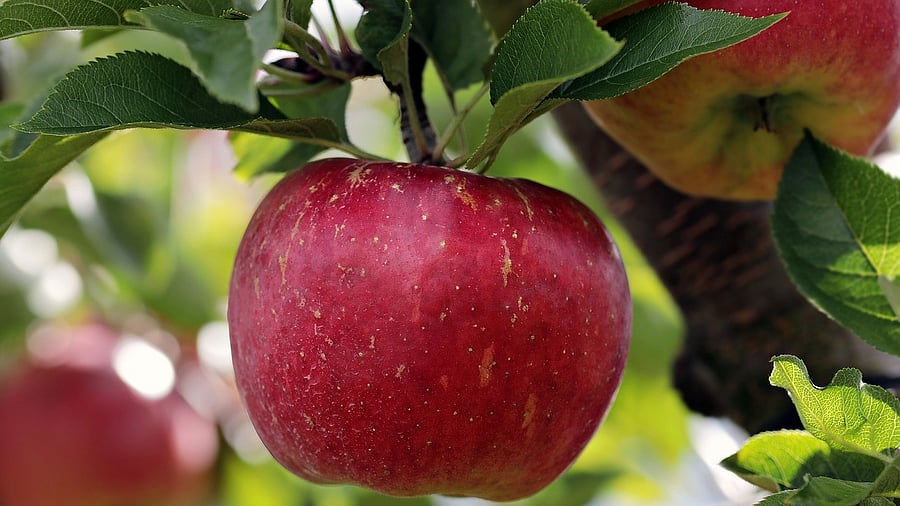
Representative image of apples.
Credit: Pixabay Photo
Srinagar: In Kashmir’s picturesque orchards, where apples have long been a symbol of the Valley’s pride and economy, an invisible crisis is festering.
Scientific evidence links the rampant use of toxic pesticides to a worrying spike in cancers across the valley — and increasingly, to the very fruit that forms the backbone of Kashmir’s horticulture industry.
A 2010 study published in the Indian Journal of Occupational and Environmental Medicine revealed that 90 per cent of brain tumor patients in Kashmir’s orchard belts had been exposed to pesticides, with all cases involving high-grade, aggressive tumors.
The study focused on orchard workers in districts like Anantnag, Budgam, and Baramulla — regions that collectively account for over 90% of the valley’s 193,109 hectares of apple orchards. Smaller districts like Kulgam and Shopian also showed significant concentrations of cases despite their relatively smaller populations.
While the human health toll is alarming, the pesticides — including mancozeb, captan, and chlorpyrifos — are also degrading Kashmir’s fruit quality and threatening long-term crop sustainability. Mancozeb, widely used to prevent apple scab, has been banned in the European Union for its carcinogenic and environmental risks.
Yet, in Kashmir, its use continues unchecked, with an estimated 3,400 metric tonnes sprayed annually, alongside 4,350 MT of captan and 3,186 MT of chlorpyrifos.
This degradation is confirmed by more recent studies. In 2025, a detailed soil analysis by Ishfaq Ahmad Mir, published in Nature Scientific Reports, examined 200 topsoil samples from the Bandipora-Ganderbal districts of the Valley. It found hazardous levels of arsenic, chromium, nickel, and vanadium, along with deficiencies in key micronutrients like copper, nickel, and zinc. The study linked these issues to long-term pesticide use and contamination from construction, fertilisers, and vehicular emissions.
The contamination isn’t limited to soil. Experts warn that pesticides are leaching into Kashmir’s water table — a crucial source for irrigation and drinking. With no systematic monitoring in place, orchardists often use contaminated water to spray their crops or irrigate fields, unknowingly reintroducing toxins into the food chain.
“In the scenario where cancers are spiking and given the established link to pesticides for brain cancer, the Kashmir healthcare system must have sprung into action to safeguard the population,” Dr Azhar Jan, a senior oncologist told DH.
He said stricter regulations to check the quality of pesticides, promotion of pest-resilient fruit varieties and exploring options of organic farming could help mitigate the crisis. In addition, there is a dire need to further research the presence of pesticides in food and water chains. Without immediate intervention, we’re looking at a public health catastrophe, Dr Jan added.
However, despite mounting evidence, regulatory measures remain lax in Kashmir and experts advocate for stringent regulations to monitor pesticide quality, promotion of pest-resistant fruit varieties, and exploration of organic farming practices.
“The lack of safety gear during spraying and poor adherence to recommended protocols are putting lives at risk,” a senior official of the Health department said. “Moreover, the silence of food safety and public health departments on pesticide contamination in water sources is deeply concerning.”
The impact is both economic and ecological. Kashmir’s apple exports are under scrutiny in international markets for high pesticide residue levels. At the same time, the long-term health of orchards is declining due to depleted soil fertility and water toxicity — a fact increasingly voiced by growers across South Kashmir.